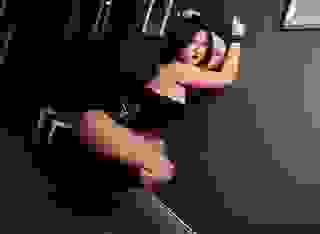- Romance
- A Coastwatcher's Duty
Note: You can change font size, font face, and turn on dark mode by clicking the "A" icon tab in the Story Info Box.
You can temporarily switch back to a Classic Literotica® experience during our ongoing public Beta testing. Please consider leaving feedback on issues you experience or suggest improvements.
Click hereWilliam Marston looked down at the expanse of ocean to the east of his hut on Vella Lavella. That stretch of ocean ran from Bougainville down through the Solomon Islands and was known to the Allies as the "Slot". This long narrow channel was the primary route for Japanese ships in their quest to occupy the Solomons in order to attack and occupy New Guinea, Australia and New Zealand.
Through his binoculars, William saw a convoy of Japanese ships consisting of two cargo ships and three destroyers. Those were part of what the Allies called "The Tokyo Express", the convoys carrying troops and supplies that would gain The Japanese Empire a firm foothold on the Solomons.
William walked from his observation post on the side of Mount Nonda to the native hut thatched with palm fronds. Inside, he turned on his radio and called the coastwatcher headquarters in Queensland.
"Q, MAR here. Three destroyers two cargo to you."
The confirmation came back a few seconds later.
"MAR, Q here. Confirm three destroyers two cargo."
William had watched several of these convoys since he'd changed jobs from the supervisor of a copra plantation to coastwatcher. He'd been happy on Vella Lavella before the Japanese began expanding. First it was Manchuria, then China, and now it was the Solomons. Three months after Bougainville had been occupied, Vella Lavella had been evacuated by the Australian Navy. There had been a few people on the island that wouldn't leave, and William was one of them. He'd never run from anything in his life and he wasn't about to run from the Japanese.
When he stated his intention to stay on Vella Lavella, he was approached by a man in the uniform of an Australian Navy Captain.
The man waked up, smiled, and offered his hand.
"Mister Marston, I hear you would rather remain on Vella Lavella. May I ask why?"
William frowned.
"I put five years of my life into making this plantation work, and I intend for it to work again once this goddamned war is over. I don't want the goddamned Japs making a mess of everything."
The captain chuckled.
"Spoken like a true Australian. I'm Captain Reginald Avery by the way. If you're going to stay on Vella Lavella, perhaps you might do me a small favor."
William frowned.
"This sounds like I'm about to get a very dry coconut pushed up my arse."
Captain Avery had been filling his pipe. He lit it then, puffed out a couple plumes of acrid smoke, then tamped down the tobacco and lit it again. He puffed twice more, then smiled.
"No, nothing quite so harsh. It is a simple request, really."
He sucked twice more on the pipe and frowned because it had gone out.
"Damned tobacco gets too moist to burn in this intolerably wet climate."
He dug in his pocket for a match, then lit the pipe again and smiled.
"William, we're having the devil of a time keeping track of our little yellow friends. Since they occupied Bougainville, their convoys stop there until almost dark and then run down between the islands in the dark to deliver troops and supplies to the other islands to the south. It's the same with their planes during the day. They take off from Bougainville and head down the Slot toward Guadalcanal. Their day of reckoning is coming, but it will be a bloody shambles unless we can be ready to fight back now.
"What I need is a good man on Vella Lavella to watch the sea and air and radio back to Queensland on what the Japanese are doing. We'll relay that information to the US and Royal forces as soon as it's confirmed by one of my men on the other islands. That'll give our boys a fighting chance at the Japs instead of being sitting ducks until they see the bombers and fighters overhead. What would you say to being one of my coastwatchers?"
William laughed.
"I'd say any man who would volunteer for the job needs his bloody brain examined. When the Japs land on Vella Lavella, they'll search the island for any white men, and judging from what I've read, they have a way of convincing people to talk. Once they find out what they want to know, they just shoot them."
Captain Avery knocked the ashes out of his pipe and began filling it again from a leather pouch.
"So, you're saying it's impossible?"
William shook his head.
"Not impossible, but very difficult and dangerous. A man would have to stay in the mountains and he'd have to have a lot of supplies. That means he'd have to have natives to carry everything and he'd need supplies for them too."
Captain Avery lit his pipe again.
"Not a problem, William. I can furnish you with enough supplies for six men for six months. I'll supply you with a radio as well. Can't expect you to just yell all the way to Queensland, now can I."
"What if this man was discovered by the Japanese?"
Captain Avery puffed his pipe twice, then frowned.
"That's always a possibility. I can tell you we'd do everything in our power to get you off Vella Lavella if that happened. You'd have to work your way down to the coast and maybe canoe to Baga, but we'd try our best to get you off."
William thought about the offer. When the Japanese occupied Bougainville, he'd tried to enlist in the Australian Army only to find out that the limp that remained after a broken leg four years before made him ineligible for service. This was a way he could give help with the war effort while staying on Vella Lavella to watch over the plantation.
"If I was to do this, what supplies could you furnish?"
The four men, all natives of Vella Lavella, had struggled to get everything halfway up the side of Mount Nonda. The supplies were no problem because the canned goods were packed in small boxes. The radio wasn't quite as easy. The thing broke down into two sections -- the radio proper and the batteries that powered it. Each weighed about a hundred pounds, so each section was carried suspended on a pole by two men. Another problem was the generator needed to charge the batteries and fuel for the generator. That required another trip up the mountain with two men carrying the generator and two men carrying the five-gallon cans of fuel.
The last trip from the beach to the mountain was for the five Enfield rifles, two crates of ammunition for them, a gasoline stove, and the binoculars and case of maps and plane and ship silhouettes.
After two more days, the native men had built a palm-thatched hut for sleeping and eating and another hidden under some trees for the radio. William settled down to life as a coastwatcher. His native boys spent the days hunting for food in the jungle or fishing and were usually successful. A roast pig or a mess of fish was a welcome change from canned stew and stretched his supplies a little further. They were also watching for any Japanese troops that might have come ashore during the night.
During the day, William would listen for planes coming from Bougainville, and when he saw them, he'd radio Queensland with the number, type, and his best guess at altitude. Every night just before dark, William would look up the Slot with his binoculars, and if he saw any ships, he'd radio that information back to Queensland.
It was a little over a month since William set up his observation post that he watched the convoy of two cargo ships and three destroyers starting to move down the Slot. He continued watching them after radioing Queensland. The convoy was just entering Kula Gulf when shells began raining down on them. William couldn't see where the shells came from but assumed it was from US Navy ships. The Japanese ships returned fire and then turned back to the north. All but the last destroyer escaped unscathed. The final destroyer was hit amidships.
By the time the last destroyer was hit, the convoy had steamed up just to the east of Vella Lavella. William saw the blast and the resulting fires. Those fires lit the ship enough to show the list to starboard and the fact that she was rapidly sinking.
William went to bed that night congratulating himself for sounding the warning in time for action to be taken. One less destroyer meant fewer Japanese soldiers would be landing on the southern islands and would make it easier for the US Marines to push them off those islands.
The next morning, Manuia and Tamati, two of William's native boys, said they were going to hunt for crabs along the shore. They left while William was enjoying a breakfast of canned herring.
It was a two-hour trip to the beach, so William didn't expect them back until almost lunchtime. He spent the morning sitting at his observation point and waiting for the inevitable flight of Japanese fighter and bombers. The first arrived an hour later and he made his report to Queensland.
"MAR here. Ten Zekes to you fifteen thousand. Six Peggies ten thousand."
"Zeke" was the codename for the Japanese "Zero" fighter. "Peggie" was the code name for the Mitsubishi KI-67 Heavy Bomber.
William had just eased back down in the chair at his observation point when Manuia and Tamati ran into the camp.
In Pidgin English, Manuia told of seeing Japanese soldiers on the beach near the village of Kumbolia. When William asked how many, Tamati held up his hands, opened and closed them again and again, and said "comin man c'noo faitau afe", roughly translated from pidgin as "many, many men come in canoes". Pidgin English didn't have words for definite numbers over a hundred. "Faitau afe" was used in pidgin to indicate anything from a hundred to thousands.
William was well aware of the native propensity to exaggerate sometimes, and he knew both men were afraid of the Japanese. A few Chinese on Bougainville had escaped by paddling a native canoe from there to the north end of Vella Lavella. They then walked down the beach to Kumbolia and told the people there the Japanese had forced the men to begin building an airstrip, and had forced the women to become prostitutes. Anyone who refused was simply shot.
What Manuia and Tamati must have seen, figured William, were a few survivors from the destroyer that was now on the bottom of Kula Gulf. From the size of the explosion, he thought there couldn't be very many. Still, Tamati kept saying "faitau afe" and opening and closing his hands.
William couldn't see the beach from his observation point. He'd have to make the trip there to see for himself. If there were only a few survivors, he wasn't worried. He'd set his four native boys out as sentries and if the Japanese got too close...
He smiled then. If his native boys could kill a pig with just a knife or a spear, they could kill a Japanese soldier before the soldier even knew he was in danger.
That afternoon, William made the trek down to the beach with Manuia and Tamati. He heard voices before he could see any people, and when he did, he was shocked. There was what looked like a flotilla of rubber life rafts pulled up on the beach. Between them and the palms that lined the beach was a throng of Japanese soldiers. Some were sitting naked by small fires over which their clothing had been hung to dry. Others were clothed and apparently were patrolling the beach with their rifles at the ready. He stopped counting at three hundred.
As the group made their way back to his camp, William was worried. It hadn't seemed as if the group was under the command of any officer. The patrolling soldiers weren't following any specific path on the beach, and in fact, he'd watched as some grouped together to talk. He figured most of their leadership had gone down when the destroyer sank. With no leadership, a concerted effort by the Japanese to search the island wasn't probable.
What was more likely to happen was the Japanese would scour the countryside looking for food and stumble onto some sign that he and his boys were there. He was also worried about the generator. He had to charge the radio batteries every other day, and the sound of the running generator might be heard from the beach.
Prudence dictated he's have to move deeper into the interior of Vella Lavella and higher. That meant moving to Mount Tambisala, the highest peak on Vella Lavella. He'd be further from the ocean, but would be able to see more of it because Mount Tambisala was a little over two thousand feet above sea level. He'd also be able to see Japanese planes sooner from that elevation and his radio would work better.
The next morning at daylight, William prepared to make the move. While his native boys packed up everything except the radio, William called Queensland.
"MAR here. J on east beach. Moving inland. Will confirm two days."
The confirmation came back, but the voice was not the usual voice he heard. Instead, he heard the unmistakable voice of Captain Avery talking with his pipe in his mouth.
"MAR, RA here. I've a bit of a sticky wicket I'm afraid. I'm sending you a package and I need to deliver it tonight sometime around midnight. Follow the path down to the south coast to the little bay near a fishing village. I'll have the package delivered there."
Captain Avery signed off without giving William a chance to ask a question.
William got out his map and traced a line between Mount Nonda and Mount Tambisala, then extended it to the south coast. His line ended near the village of Joroveto and the small bay was about half a mile northeast of the village. He'd have to walk a little over twelve miles from Mount Nonda to the bay and then another nine back to Mount Tambisala.
William sent his two strongest native boys, Aleki and Akema, to the spot he'd picked on Mount Tambisala with what was left of their supplies. Once there, they'd return and start back with the radio. William figured they'd be able to make the round trip in about three hours, so by nightfall, they'd have their supplies, radio, and batteries at the new location.
He, Manuia, and Tamati would make the trip to the coast, pick up whatever it was Captain Avery had for him, and then go to the new location on Mount Tambisala. The next day, they'd ferry anything left at the old site to Mount Tambisala, and then tear down the old camp. In a couple of weeks, the jungle would reclaim everything and no one would know he'd ever been there.
At eleven that night, William, Manuia, and Tamati were back in the trees off the beach of the little bay. There was little light from the crescent moon that night, but about an hour and a half later, Manuia pointed out to sea and whispered "comin' c'noo".
When the native canoe beached on the sand, William saw there were three people in it. The one in front dropped his paddle inside the canoe, jumped out, and pulled the canoe up on the beach enough it wouldn't float back out to sea. Then, he helped the person in the middle out of the canoe. That person started walking in William's direction as the first man pushed the canoe back out and jumped inside. The two men then turned the canoe around and paddled back out to sea.
So, thought William, Captain Avery's package was probably an American pilot who'd bailed out of his plane. He'd witnessed a lot of dogfights over the Slot and he'd heard of that happening before. The pilot would bail out of his crippled plane, swim to shore someplace, and if lucky, would meet up with some natives. Most natives in the Solomons had witnessed or heard about what the Japanese did as soon as they occupied an island, so they were more than happy to help a pilot or seaman who wasn't Japanese. The natives would hide the pilot and get word to one of the coast watchers who would try to get the pilot or seaman back to safety and back in the fight.
When the person was half way up the beach, he sat down on the sand. William waited for another hour before venturing out of the trees because there was still some possible danger.
Queensland knew the Japanese were probably listening in to the reports of the coastwatchers. That's why the reports were short and to the point, the coastwatcher was identified only by a few letters, and the name of his island was never revealed. The Japanese had radio direction finders that could locate a coachwatcher's radio if he transmitted for very long.
It was possible that over time, the Japanese had located him on Vella Lavella but not his actual location. When William told Queensland he was moving and Captain Avery had relayed the message about a package, Japanese intelligence might have put two and two together and figured out where on Vella Lavella the meeting was to take place. They could be waiting in the trees for anyone going to the man sitting on the sand.
After an hour, there was no sound except the lapping of the surf on the sand, so William sent Tamati to bring the man back to where they hid. Tamati crawled out to the man slowly and tapped him on the leg. The man started, but then crawled behind Tamati back to the trees.
Tamati stood up when he was inside the treeline, chuckled, and touched his chest.
"Man no, fatafata she".
William started to ask Tamati what he was talking about when he heard a soft, low female voice.
"Yes, fatafata. All women have fatafata. Who's in charge here?"
William stepped forward.
"William Marston at your service, Ma'am. We need to be moving to get to my camp before daylight, so please follow me and don't talk. There are Japanese soldiers on Vella Lavella and I'm not certain how far inland they've gotten."
As they walked and climbed the nine miles to the location of his new outpost, William cursed Captain Avery. It wasn't enough that he had to live like a goddamned native in the interior of Vella Lavella and risk his life to transmit information about Japanese ships and planes heading down the Slot. Now, Avery had saddled him with a goddamned woman. What the bloody hell was he going to do with a goddamned woman in the middle of the jungle? Who was she anyway and where had she come from and why the bloody hell had Avery sent her to Vella Lavella instead of some other island?
As far as he could tell, the only thing she'd brought with her was the clothes on her back. She'd need more clothes and she'd need things men didn't need as well. He'd have to call Queensland and ask for a parachute drop, and that risked giving away his position.
The woman had sounded pretty commanding back at the beach. What if she tried to boss him and the native boys around? Some of the women on the islands were married to or daughters of some very wealthy men and were accustomed to getting what they wanted. What if she was one of those, a goddamned spoiled bitch of a woman who thought she should have warm rose water for her bath even though there was a war going on?
After almost five hours of first walking and then climbing their way up the side of Mount Tambisala they reached the site he'd picked. Aleki was waiting with one of the Enfields in his hand and watching down the way he knew William would come. When he saw William, he slung the Enfield over his shoulder and walked out to meet them.
William asked Aleki if he'd seen or heard anything unusual, and Aleki replied in pidgen that he'd see some ships just before dark but nothing else. William couldn't report that, but he knew a couple more coastwatchers would at least hear the ships passing and report it.
He turned then to the woman.
"Ma'am, I don't yet have a hut built so you'll be sleeping on the ground tonight. We have to bring the generator and fuel from my old site here tomorrow morning. Once that's done, we'll build someplace for you to sleep."
It was still dark enough William couldn't really see her face, but he thought she was probably frowning.
"Mr. Marston, I'm so tired I could sleep on a pile of coconuts. What time are we leaving for your old site? Since you rescued me, I should at least offer to help."
William said they'd leave at first light, but he'd leave Aleki with her so she wouldn't be alone. She laughed then.
"Mr. Marston, I've been alone since the Japanese came to Kulombangara. I'm coming with you. Many hands make for lighter work. Just give me a shake when breakfast is ready. You do eat breakfast don't you?"








